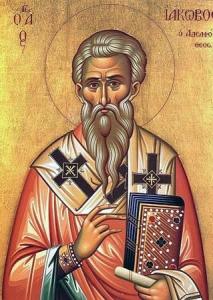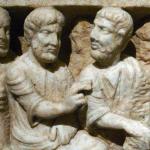
Eastern tradition says that James, the brother of the lord, is Jesus’ brother, not by blood, but because he was Joseph’s son from a previous marriage. That is, it suggests Joseph was a widower who had many children of his own before he became Mary’s husband and guardian. It is because he was both a holy man and had experience raising his own children, he was prepared to raise Jesus. This is why when we see James mentioned as one of Jesus’ family, it is in connection to Joseph: the general populace believe Joseph was Jesus’ biological father, and so they saw all of Joseph’s children as Jesus’ own siblings:
And when Jesus had finished these parables, he went away from there, and coming to his own country he taught them in their synagogue, so that they were astonished, and said, “Where did this man get this wisdom and these mighty works? Is not this the carpenter’s son? Is not his mother called Mary? And are not his brothers James and Joseph and Simon and Judas? And are not all his sisters with us? Where then did this man get all this?” And they took offense at him. But Jesus said to them, “A prophet is not without honor except in his own country and in his own house.” 58 And he did not do many mighty works there, because of their unbelief (Matt. 13:53-58 RSV).
James, we are told, was a just man, recognized as being just by Jews and Christians alike. When we explore the book of James, which is attributed to him, we get a sense of what his since of justice entailed. We find he continued follow Jesus in engaging issues of social justice. He told the faithful that they must take care for the poor, the needy, the outcast, indeed, this is one of the prominent messages found in what he wrote. When he tells Christians they are justified by works of faith and not just by faith alone, we must see that those works of faith include social justice and its expectations. The rich, those who exploit the poor, are among those whom James specifically warned as being far from what Christ would have them be like:
Come now, you rich, weep and howl for the miseries that are coming upon you. Your riches have rotted and your garments are moth-eaten. Your gold and silver have rusted, and their rust will be evidence against you and will eat your flesh like fire. You have laid up treasure for the last days. Behold, the wages of the laborers who mowed your fields, which you kept back by fraud, cry out; and the cries of the harvesters have reached the ears of the Lord of hosts. You have lived on the earth in luxury and in pleasure; you have fattened your hearts in a day of slaughter. You have condemned, you have killed the righteous man; he does not resist you (Jas. 5:1- RSV).
James knew the cries of the poor, and called out the rich, proving that Christ’s message to the rich was not something to be seen as merely true during Christ’s temporal ministry and cast aside in the wake of his death and resurrection. It remains a hallmark of the Christian teaching, and all those who would undermine the preferential option for the poor and promote the rich and their desires over and above the poor and their needs should heed James’ warning to the rich and those who appease the rich. No matter how much the rich and powerful might try to justify themselves with their wealth and the power which their wealth gives to them, it is as nothing in comparison to the injustices they have done, and the consequences which flow from those injustices will not be thwarted by their wealth (unless, of course, they repent and make restitution or reparations for what they have done, as no one is outside of God’s mercy and grace, and everyone can be reformed). Sadly, too many Christians have forgotten this; they have not only abandoned the preferential option for the poor (which works for the poor in order to undermine the injustices they face), they seem to replace it with a preferential option for the rich, the powerful, the famous – allowing those who have hurt and neglected the poor, those who have created injustices in society and reified them with structures, structures of sin, to be praised and given preference instead of those who need help to get out of the unjust situations they find themselves in. It was something James saw happening in his time, and again, he made it clear, it went against the Christian way, the way of justice:
My brethren, show no partiality as you hold the faith of our Lord Jesus Christ, the Lord of glory. For if a man with gold rings and in fine clothing comes into your assembly, and a poor man in shabby clothing also comes in, and you pay attention to the one who wears the fine clothing and say, “Have a seat here, please,” while you say to the poor man, “Stand there,” or, “Sit at my feet,” have you not made distinctions among yourselves, and become judges with evil thoughts? Listen, my beloved brethren. Has not God chosen those who are poor in the world to be rich in faith and heirs of the kingdom which he has promised to those who love him? But you have dishonored the poor man. Is it not the rich who oppress you, is it not they who drag you into court? 7 it not they who blaspheme that honorable name which was invoked over you? (Jas. 2:1-7 RSV).
We can see the truth of this today; too many Christians join themselves with the oppressors, hoping that by supplicating the rich and powerful, they can join in and be one of them as well. While a few might get what they want, most will not, and many who do not will have created the conditions for their own undoing, as they will find the rich and powerful they placated turn on them ever so quickly, letting them be sacrificed as a scapegoat if need be. James, therefore, shows us that what Christ said about the poor, about how the poor are to be blessed , and what Christ said about the rich, about how they are creating the conditions for their own doom, continues to be true even after the Easter-event. Those who would say the preferential option for the poor (or the oppressed) is its own kind of partiality, do so as sophists, because how does helping people who have not received equal justice, helping to promote equality of human dignity and equity, create impartiality, when all it is doing is reversing the impartiality which is already there?
Stay in touch! Like A Little Bit of Nothing on Facebook.
If you liked what you read, please consider sharing it with your friends and family!
N.B.: While I read comments to moderate them, I rarely respond to them. If I don’t respond to your comment directly, don’t assume I am unthankful for it. I appreciate it. But I want readers to feel free to ask questions, and hopefully, dialogue with each other. I have shared what I wanted to say, though some responses will get a brief reply by me, or, if I find it interesting and something I can engage fully, as the foundation for another post. I have had many posts inspired or improved upon thanks to my readers.













